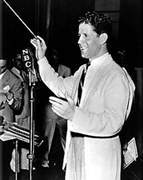In Chapter Eight of Rudy Vallée’s 1930 memoir, Vagabond Dreams Come True, Rudy finally takes a break from pontificating about his theories of dance orchestra stewardship and relates tales of the early days of his band of eight in New York City.
Success—But Not Over Night
OUR first broadcast from The Heigh-Ho in February, 1928, brought about twelve letters.
 WABC was a small station, with radius confined to New York but it was a station of beautiful quality and power and has since become the key station of the gigantic Columbia Broadcasting System.
WABC was a small station, with radius confined to New York but it was a station of beautiful quality and power and has since become the key station of the gigantic Columbia Broadcasting System.None of our write-ups has ever given credit where it belonged; even at the risk of injuring feelings I must pay due tribute and express my gratitude to stations WABC and WOR and WMCA which were responsible for the tremendous outburst we received February, 1929, at Keith’s 81st Street Theatre in New York City. When we began at station WABC, our band was only a small speck on New York’s horizon. But the enthusiasm which my surprised eyes read in those first letters affected me like magic. Still, the full realization of our powers did not dawn on me until about a month of broadcasting had elapsed.
Station WABC had a schedule that was far from full and they needed us to fill three or four gaps a week, sometimes for half an hour, sometimes an hour. At first we had a definite schedule, then it would vary and at any moment during the evening we might expect a call from the studio to jump into the breach when some artist had failed to appear.
To make my programs more co-ordinated, like a well-oiled machine, I realized that each man must know exactly what was going to happen. Here, more than ever, we were handicapped because obviously the directions could not be spoken and since I was playing the saxophone I was not free to indicate the routine by pantomime. So I conceived the idea of giving each man a typewritten program of the numbers.
Since we were on the air as often as four or five times a week I realized too that every program must be different from the others, as much as possible, with repeats only when the number was very popular and frequently requested. I secured a hectograph, or duplicating machine, and a typewriter, and in my own home-made fashion, with two fingers, typed out the programs, staying in to do so while the boys went out to eat between dinner and supper sessions.
Sometimes I spend as much as one hour just deciding which would be the best tunes to play, typing out the program and duplicating seven or eight copies of it. But I found that my efforts were well reward by a much smoother program.
The boys often wondered why I was so exacting and apparently unreasonable in my demands that every program be well-nigh perfect. If a mistake was unavoidable, I said nothing, but if the offender was day-dreaming, stupid, or heedless, the resulting error was brought to his attention immediately after the broadcast, and if it was really noticeable he would probably hear about it the rest of the evening.
But today I think the boys appreciate what my high ideals have brought us. I read the fan mail; they did not, although I invited them to do so.
I began to see what was happening.
One of my boys suggested that we were on the air too many times a week, but he did not see my theory which was this: I believed that by being on the air as often as four or five times a week, which is unusual in radio circles, eventually nearly every radio fan would stumble across us when moving the dials, and that our odd quality of tone and style would hold their attention, and that by having each program completely varied and different, carefully chosen and rendered, we would not become monotonous if one listened in every time we were on. Our terrific success has shown my conclusions to be completely justified. Our fan mail increased daily and my letters, which nearly all complimented us in superlative terms, bore witness to the fact there was something in the nature of our music that was different and that held the attention.
The speck on the horizon had begun to loom larger.
